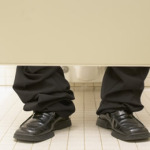Why Does Prostate Cancer Cause Constipation?
Prostate cancer rarely causes symptoms at early stage. If it does cause the symptoms, these can be very vague. Constipation is commonly associated with dietary factors. But sometime it can be a consequence from cancer of prostate at advanced stage. Furthermore, some treatments for cancer can contribute to cause constipation, too.
This form of male cancer is pretty common, even in some countries it is the most common cancer in men. The good news, it is likely to develop slowly – not aggressively. Even in many cases, patients are suggested to delay taking the treatment, but the disease is continuously monitored.
The bad news, it is less likely to cause symptoms at early stage. The symptoms are more likely to be noticed at advanced stage. Even there is a chance for some patients to have it for many years without knowing it.
The symptoms occur more often when the affected prostate has been large enough to hit and affect the tube that lines from the bladder to the male genital organ. This tube is medically called as urethra.
The affected urethra due to prostate cancer can be characterized by several symptoms. Some of them may include a feeling of not-completely emptying bladder after you pee, increased urge to urinate, and you need to strain to pass urine. See more early signs of prostate cancer in here!
Having one or some of these symptoms doesn’t mean you definitely have cancer of prostate. But they may signal that something goes awry with the urethra.
 In normal process of making waste products (stools); as what you eat moves through the colon (large bowel or large intestine) your colon will reabsorb water while forming the waste products. The muscles around the colon then push them toward the back passage (rectum). By the time they reach the back passage, most water has been reabsorbed, producing the solid stools.
In normal process of making waste products (stools); as what you eat moves through the colon (large bowel or large intestine) your colon will reabsorb water while forming the waste products. The muscles around the colon then push them toward the back passage (rectum). By the time they reach the back passage, most water has been reabsorbed, producing the solid stools.
Constipation occurs when the waste products move slower than usual in the large bowel or when they stay too long in the large bowel. As they remain in the large bowel, fluid is reabsorbed as noted before. So, the longer the stool stays in the large bowel, more fluid is reabsorbed, making the constipation worse.
So in general, constipation is a consequence of the colon reabsorbing too much water when the stools remain too long or move too slow in the colon.
This digestive problem is often associated with lifestyle factors, though sometime it can be a result from taking certain medications, too. Some of these causes include:
- Dietary factors particular such as low in dietary fiber and not enough liquid.
- Lifestyle factors such as lack of physical activity, traveling, ignoring /skipping the urge of a bowel movement, and so on.
- Certain medications such as some medicines for hypertension, sedatives, etc.,
- Some conditions, such as irritable bowel syndrome, pregnancy, and diabetes.
Like most things in cancer, there is a chance for cancer in the prostate to spread and affect other sites or organs of the body. Bones and lymph nodes are the most common sites where it spreads.
The cancerous tumor in the prostate can be large enough to affect the nearby tissues and organs such as urethra, bladder, ureters, and rectum.
When prostate cancer has affected the rectum, constipation and other bowel problems can be the symptoms.
It’s rare for cancer of prostate to spread and affect the rectum. But if the rectum has been affected, you can experience some bowel problems such as constipation. And this can be followed with other unusual symptoms such as pain and bleeding.
However, having constipation doesn’t mean that your cancer definitely has spread to the rectum or has affected the rectum. Because this symptom can be a side effect of certain medications for cancer, too – such as radiation therapy and chemotherapy!
For summary, the following is variety of some possible reasons of why men with prostate cancer can experience constipation, and some tips for coping:



